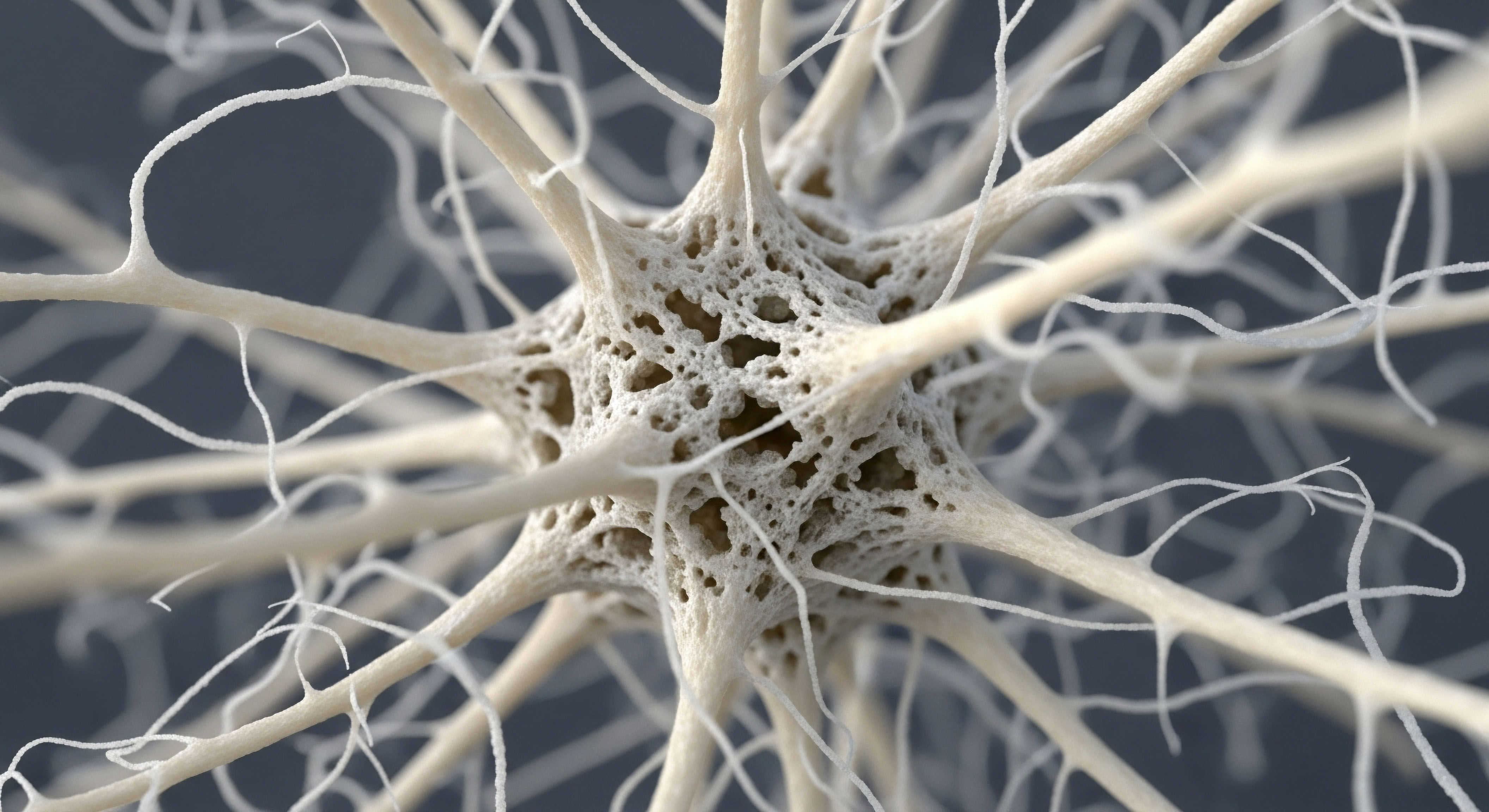

Fundamentals
Have you ever experienced those moments when your thoughts feel clouded, your memory seems to falter, or concentrating becomes an unexpected challenge? Perhaps you find yourself searching for words that once came easily, or navigating familiar tasks with a surprising sense of mental friction.
This experience, often dismissed as simply “brain fog” or attributed solely to stress, can be deeply unsettling. It can leave you questioning your mental sharpness, impacting your daily life and sense of self. We understand this lived experience, the frustration of a mind that feels less agile than it once was. This feeling extends far beyond mere fluctuations in emotional state; it points to deeper, systemic influences within your biological framework.
Your body operates as an intricate network of communication, where chemical messengers orchestrate countless physiological processes. Among these vital messengers are hormones, substances produced by the endocrine glands that travel through your bloodstream to influence cells and organs throughout your body. They act as a sophisticated internal messaging service, ensuring that various bodily functions remain in precise coordination. This complex system governs everything from your metabolism and energy levels to your sleep cycles and, critically, your cognitive capabilities.

The Endocrine System and Brain Function
The endocrine system, a collection of glands that produce and secrete hormones, maintains a constant dialogue with your brain. Hormones are not confined to regulating reproductive functions or metabolic rates; they directly interact with brain cells, influencing neural pathways and neurotransmitter activity. This interaction is fundamental to how you think, process information, and retain memories.
When these hormonal signals are balanced, your brain operates with optimal clarity and efficiency. Conversely, disruptions in this delicate equilibrium can manifest as noticeable changes in cognitive performance.
Hormonal balance acts as a conductor for brain function, influencing clarity, memory, and mental agility.
Consider the profound impact of key endocrine glands. The thyroid gland, for instance, produces hormones that regulate metabolism in every cell, including those in the brain. An underactive thyroid can lead to sluggish thought processes and impaired memory, while an overactive thyroid might cause anxiety and difficulty focusing. Similarly, the adrenal glands release cortisol, a stress hormone. While essential for short-term stress responses, chronically elevated cortisol levels can negatively affect the hippocampus, a brain region central to memory formation.

Hormonal Influence on Neural Pathways
Hormones exert their influence by binding to specific receptors located on neurons, the brain’s fundamental communication units. This binding initiates a cascade of intracellular events that can alter neuronal excitability, synaptic plasticity, and even the growth of new brain cells. For example, sex steroids, such as estrogens and androgens, are known to modulate the activity of neurotransmitters like acetylcholine, serotonin, and dopamine, all of which play significant roles in cognitive processes such as attention, learning, and memory consolidation.
Understanding these foundational biological concepts provides a framework for recognizing that cognitive shifts are not simply psychological states. They are often rooted in measurable physiological changes within your hormonal landscape. This perspective shifts the conversation from merely coping with symptoms to actively seeking systemic recalibration for improved mental vitality.


Intermediate
Once we recognize the profound connection between hormonal equilibrium and cognitive function, the next step involves exploring targeted clinical protocols designed to restore this balance. These interventions move beyond general wellness advice, offering precise biochemical recalibration to support optimal brain performance. The ‘how’ and ‘why’ of these therapies lie in their ability to modulate specific hormonal pathways, thereby influencing neural health and cognitive output.

Targeted Hormonal Optimization Protocols
Personalized hormonal optimization protocols are tailored to address individual deficiencies and imbalances. These approaches consider the unique hormonal profile of each person, aiming to bring levels into a range that supports not only physical well-being but also mental acuity.

Testosterone Replacement Therapy for Men
For men experiencing symptoms of declining testosterone, often termed andropause, Testosterone Replacement Therapy (TRT) can be a transformative intervention. Low testosterone levels have been linked to reduced cognitive ability, including challenges with spatial reasoning and verbal memory. A standard protocol often involves weekly intramuscular injections of Testosterone Cypionate (200mg/ml). This exogenous testosterone helps restore circulating levels, which can positively influence brain function.
To maintain the body’s natural endocrine rhythm and preserve fertility, TRT protocols frequently incorporate additional agents ∞
- Gonadorelin ∞ Administered via subcutaneous injections twice weekly, this agent stimulates the pituitary gland to release luteinizing hormone (LH) and follicle-stimulating hormone (FSH), thereby supporting endogenous testosterone production and testicular function.
- Anastrozole ∞ This oral tablet, taken twice weekly, acts as an aromatase inhibitor.
It helps prevent the conversion of testosterone into estrogen, mitigating potential side effects such as gynecomastia and fluid retention, which can occur with elevated estrogen levels.
- Enclomiphene ∞ In some cases, this medication may be included to specifically support LH and FSH levels, further promoting the body’s own hormonal signaling.
These components work synergistically to optimize testosterone levels while minimizing adverse effects, creating a more balanced hormonal environment conducive to improved cognitive clarity.

Testosterone and Progesterone Balance for Women
Women, particularly those in pre-menopausal, peri-menopausal, or post-menopausal stages, can also experience cognitive shifts due to hormonal fluctuations. Declining estrogen and progesterone levels are often associated with symptoms like brain fog, memory lapses, and difficulty concentrating.
Protocols for women typically involve ∞
- Testosterone Cypionate ∞ Administered in much lower doses, typically 10 ∞ 20 units (0.1 ∞ 0.2ml) weekly via subcutaneous injection. Even small amounts of testosterone can significantly impact libido, energy, and cognitive function in women.
- Progesterone ∞ Prescribed based on individual menopausal status, progesterone plays a vital role in brain health.
It has neuroprotective properties and can influence mood and cognitive processing.
- Pellet Therapy ∞ Long-acting testosterone pellets offer a convenient alternative, providing a steady release of the hormone over several months. Anastrozole may be co-administered when appropriate to manage estrogen conversion.
These precise adjustments aim to restore a harmonious hormonal environment, supporting neural connections and cognitive functions that may have been compromised by natural hormonal decline.
Personalized hormonal protocols offer precise biochemical recalibration to support brain performance and mental acuity.

Growth Hormone Peptide Therapy
Beyond traditional hormone replacement, targeted peptide therapies offer another avenue for enhancing cognitive function and overall vitality. These specialized protein fragments act as signaling molecules, prompting the body to produce more of its own growth hormone (GH) or influencing other biological processes.
Key peptides utilized in this context include ∞
- Sermorelin ∞ A growth hormone-releasing hormone (GHRH) analog that stimulates the pituitary gland to release GH. This can lead to improved sleep quality, which indirectly supports cognitive function, and may directly influence mental clarity.
- Ipamorelin / CJC-1295 ∞ These peptides also stimulate GH release, often used in combination for a synergistic effect.
They are associated with benefits such as enhanced muscle gain, fat loss, and improved recovery, all of which contribute to a more robust physiological state that supports brain health.
- Tesamorelin ∞ Known for its ability to reduce visceral fat, Tesamorelin also has demonstrated neurocognitive benefits, particularly in areas related to verbal memory and executive function.
- Hexarelin ∞ Another potent GH secretagogue, Hexarelin can contribute to improved body composition and potentially cognitive benefits through its influence on GH pathways.
- MK-677 ∞ An oral GH secretagogue that increases GH and IGF-1 levels, MK-677 is often used for its effects on sleep, body composition, and potential cognitive support.
Other targeted peptides extend these benefits ∞
- PT-141 ∞ Primarily used for sexual health, its influence on central nervous system pathways can indirectly support overall well-being, which is foundational for cognitive performance.
- Pentadeca Arginate (PDA) ∞ This peptide is recognized for its roles in tissue repair, healing processes, and inflammation modulation. Reducing systemic inflammation can have a direct positive impact on brain health and cognitive function.

Post-TRT or Fertility-Stimulating Protocols for Men
For men who have discontinued TRT or are seeking to restore fertility, specific protocols are implemented to reactivate natural hormone production. These protocols are also designed to support overall endocrine health, which has downstream effects on cognitive vitality.
A typical protocol includes ∞
- Gonadorelin ∞ Continues to stimulate LH and FSH, encouraging the testes to resume natural testosterone production.
- Tamoxifen ∞ A selective estrogen receptor modulator (SERM) that can block estrogen’s negative feedback on the pituitary, thereby increasing LH and FSH release.
- Clomid (Clomiphene Citrate) ∞ Another SERM that stimulates the pituitary to release more gonadotropins, leading to increased endogenous testosterone production.
- Anastrozole ∞ Optionally included to manage estrogen levels during the recovery phase, preventing potential side effects as testosterone production ramps up.
These carefully orchestrated interventions underscore the principle that hormonal systems are dynamic and interconnected.
By addressing imbalances with precision, we aim to restore not just physical markers but also the mental clarity and vitality that individuals seek.
The following table provides a comparative overview of how different hormonal and peptide interventions can influence various aspects of cognitive function ∞
| Intervention Type | Primary Hormonal Influence | Potential Cognitive Benefits | Mechanism of Action |
|---|---|---|---|
| Testosterone Replacement (Men) | Testosterone, Estrogen (managed) | Spatial memory, verbal memory, mental clarity, focus | Direct binding to androgen receptors in brain, modulation of neurotransmitters, neuroprotection. |
| Testosterone Replacement (Women) | Testosterone, Progesterone | Libido, energy, mood stability, cognitive sharpness | Influence on neural excitability, synaptic plasticity, and neurotransmitter balance. |
| Growth Hormone Peptides | Growth Hormone, IGF-1 | Reduced brain fog, improved focus, memory, sleep quality | Stimulation of neurogenesis, enhanced neural connections, improved cerebral blood flow. |
| Post-TRT/Fertility Protocols | LH, FSH, Endogenous Testosterone | Restored mental energy, mood balance, overall cognitive support | Reactivation of natural HPG axis, systemic hormonal rebalancing. |


Academic
To truly appreciate the depth of hormonal influence on cognitive performance, we must delve into the intricate biological mechanisms at a more sophisticated level. This involves understanding the complex interplay of neuroendocrine axes, metabolic pathways, and neurotransmitter systems that collectively shape our mental landscape. The brain is not merely a passive recipient of hormonal signals; it is an active participant in a continuous feedback loop, adapting its function based on the circulating biochemical environment.

The Hypothalamic-Pituitary-Gonadal Axis and Cognition
The Hypothalamic-Pituitary-Gonadal (HPG) axis represents a central regulatory system for reproductive hormones, yet its influence extends significantly into cognitive domains. This axis operates through a hierarchical signaling cascade ∞ the hypothalamus releases gonadotropin-releasing hormone (GnRH), which stimulates the pituitary gland to secrete luteinizing hormone (LH) and follicle-stimulating hormone (FSH).
These gonadotropins then act on the gonads (testes in men, ovaries in women) to produce sex steroids like testosterone, estrogen, and progesterone. These sex steroids, in turn, exert feedback on the hypothalamus and pituitary, completing the loop.
Disruptions within this axis, whether due to aging, stress, or other factors, can profoundly affect brain function. For instance, the hippocampus, a brain region central to learning and memory, possesses a high density of receptors for sex steroids.
Fluctuations in estrogen and testosterone levels directly influence hippocampal neurogenesis (the creation of new neurons) and synaptic plasticity (the ability of synapses to strengthen or weaken over time), both of which are fundamental to cognitive processes. Research indicates that maintaining optimal levels of these hormones can support neuronal health and enhance signaling cascades associated with learning and memory.

Molecular Mechanisms of Hormone Action in the Brain
Hormones influence brain cells through various molecular mechanisms. They can bind to intracellular receptors, acting as transcription factors that regulate gene expression, thereby altering the synthesis of proteins critical for neuronal function. Additionally, some hormones interact with membrane receptors, initiating rapid, non-genomic signaling cascades that quickly modulate neuronal excitability and neurotransmitter release.
Consider the actions of estradiol, a potent estrogen. It can increase the concentration of neurotransmitters such as serotonin, dopamine, and norepinephrine at neuronal synapses. It also affects their release, reuptake, and enzymatic inactivation, and can increase the number of receptors for these neurotransmitters. These actions directly impact mood regulation, attention, and cognitive processing speed.
Similarly, testosterone and its metabolites, like dihydrotestosterone (DHT), bind to androgen receptors widely distributed in the brain, influencing neuronal survival, axonal growth, and synaptic integrity. These direct effects contribute to the observed improvements in spatial and verbal memory with appropriate hormonal support.
Hormones act as sophisticated modulators of brain function, influencing neuronal health and cognitive processing at a molecular level.

Interconnectedness of Endocrine and Metabolic Systems
Cognitive performance is not solely dependent on sex steroids; it is deeply intertwined with broader metabolic health. The endocrine system operates as a cohesive unit, where imbalances in one area can cascade into others, affecting brain function.
For example, insulin sensitivity and glucose metabolism are critical for brain energy supply. Hormones like insulin and glucagon regulate blood sugar, and chronic dysregulation, such as insulin resistance, can impair cognitive function by reducing glucose uptake in brain cells and promoting neuroinflammation. Thyroid hormones, produced by the thyroid gland, directly regulate the metabolic rate of brain cells.
Hypothyroidism, characterized by low thyroid hormone levels, commonly presents with symptoms of brain fog, slowed thinking, and memory impairment due to reduced cerebral metabolic activity.
Furthermore, systemic inflammation, often driven by metabolic dysfunction, can cross the blood-brain barrier and contribute to neuroinflammation, damaging neurons and impairing synaptic function. Hormonal balance, particularly through the actions of sex steroids and growth hormone, can modulate inflammatory pathways, offering a neuroprotective effect.

The Role of Peptides in Neurocognitive Support
Peptides, as discussed previously, offer targeted support by influencing specific biological pathways. For instance, growth hormone-releasing peptides (GHRPs) stimulate the natural release of growth hormone (GH). GH and its downstream mediator, Insulin-like Growth Factor 1 (IGF-1), are critical for neurogenesis, synaptic plasticity, and overall brain health. IGF-1 can cross the blood-brain barrier and has been shown to improve cognitive performance, particularly in areas related to memory and learning.
Other peptides, like Semax, a synthetic derivative of adrenocorticotropic hormone (ACTH), increase brain-derived neurotrophic factor (BDNF). BDNF is a protein that supports the growth, survival, and differentiation of neurons, playing a vital role in learning and memory. Similarly, Selank, derived from a natural immune peptide, exhibits both cognitive-enhancing and anxiolytic effects, influencing attention, learning, and stress reduction by modulating neurotransmitter levels.
The following table summarizes the complex interplay between various hormonal and metabolic factors and their direct impact on cognitive domains ∞
| Hormone/Factor | Primary System | Cognitive Impact | Underlying Mechanism |
|---|---|---|---|
| Estrogen | HPG Axis | Verbal memory, processing speed, neuroprotection | Modulates neurotransmitters (acetylcholine, serotonin), enhances synaptic plasticity, neurogenesis. |
| Testosterone | HPG Axis | Spatial memory, executive function, attention | Androgen receptor binding, neuronal survival, axonal growth, anti-inflammatory effects. |
| Progesterone | HPG Axis | Visual memory, neuroprotection, mood stability | Influences GABA and glutamate systems, supports myelin formation. |
| Thyroid Hormones | HPT Axis | Overall cognitive speed, memory, attention | Regulates cerebral metabolic rate, neuronal differentiation, and myelination. |
| Cortisol (Chronic High) | HPA Axis | Memory impairment, reduced hippocampal volume, executive dysfunction | Glucocorticoid receptor overstimulation, neurotoxicity, impaired neurogenesis. |
| Growth Hormone/IGF-1 | HPS Axis | Memory, learning, reduced brain fog, neuroprotection | Stimulates neurogenesis, synaptic density, cerebral blood flow, anti-inflammatory. |
| Insulin Sensitivity | Metabolic System | Memory, executive function, overall cognitive health | Regulates brain glucose uptake, influences neuronal signaling, reduces neuroinflammation. |
Understanding these deep biological connections allows for a truly personalized approach to wellness. It moves beyond treating isolated symptoms, instead focusing on the systemic recalibration necessary to reclaim full cognitive vitality. This scientific precision, combined with an empathetic understanding of the individual’s experience, forms the bedrock of effective health optimization.

How Do Hormonal Imbalances Affect Brain Plasticity?
Brain plasticity, the brain’s ability to reorganize itself by forming new neural connections throughout life, is fundamental to learning and memory. Hormones play a significant role in modulating this adaptability. For example, sex steroids influence the density of dendritic spines, which are small protrusions on neurons that receive synaptic inputs.
A reduction in these spines can impair communication between neurons, leading to cognitive deficits. Estrogen, in particular, has been shown to promote dendritic spine density in the hippocampus and prefrontal cortex, areas critical for higher-order cognitive functions.
The impact of hormonal shifts on brain plasticity is particularly evident during life transitions such as perimenopause and andropause. The decline in circulating sex hormones during these periods can lead to altered neural connectivity and decreased activation in brain regions vital for memory and attention.
While some of these changes may be transient, prolonged hormonal deficiency can contribute to more persistent neurodegenerative changes. This highlights the importance of addressing hormonal balance proactively to support long-term brain health and cognitive resilience.

References
- Sherwin, B. B. (2003). Estrogen and cognitive functioning in women. Endocrine Reviews, 24(2), 133-151.
- Hogervorst, E. Williams, J. Budge, M. & Smith, A. D. (2000). Plasma testosterone and cognition in men. Neuroscience Letters, 296(1), 75-78.
- Davis, S. R. & Wahlin-Jacobsen, S. (2015). Testosterone in women ∞ the clinical significance. The Lancet Diabetes & Endocrinology, 3(12), 980-992.
- Giustina, A. & Veldhuis, J. D. (1998). Pathophysiology of the neuroregulation of growth hormone secretion. Endocrine Reviews, 19(6), 717-797.
- Cherrier, M. M. Asthana, S. Plymate, S. Baker, L. Matsumoto, A. M. Peskind, E. & Raskind, M. A. (2005). Testosterone supplementation improves spatial and verbal memory in healthy older men. Neurology, 64(12), 2005-2008.
- Resnick, S. M. Henderson, V. W. & the WHIMS Investigators. (2002). Estrogen, the brain, and cognition ∞ current controversies and future directions. Journal of Women’s Health & Gender-Based Medicine, 11(7), 589-598.
- Maki, P. M. & Hogervorst, E. (2014). Hormones and cognitive function ∞ current concepts and future directions. Current Opinion in Neurology, 27(2), 191-197.
- Pardridge, W. M. (2007). Blood-brain barrier and peptide drug delivery. Pharmaceutical Research, 24(9), 1733-1741.
- Popovic, V. & Leal-Cerro, A. (2007). Growth hormone and cognition. Growth Hormone & IGF Research, 17(Suppl 1), S11-S16.
- Müller, H. K. & Deuschle, M. (2007). Neuroendocrine aspects of cognitive aging. Journal of Neural Transmission, 114(1), 1-12.

Reflection
As you consider the intricate connections between your hormonal landscape and your cognitive vitality, recognize that this understanding is a powerful tool. It invites you to look beyond superficial explanations for shifts in mental clarity, instead prompting a deeper inquiry into your unique biological systems.
This journey toward reclaiming optimal function is not about chasing fleeting trends; it involves a precise, evidence-based recalibration of your internal environment. Your personal experience of cognitive changes serves as a compass, guiding the exploration of what your body truly needs. Armed with this knowledge, you can begin to ask more informed questions, seeking personalized guidance that honors your individual physiology and supports your pursuit of sustained well-being.



